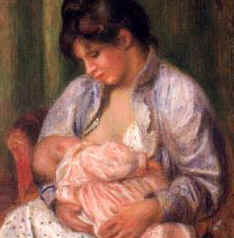Mastitis
 Oh the joys of new motherhood! Rocking in your glider chair your new baby suckles your breast cooing as he or she drinks. You cradle your baby’s head lovingly as you smile down upon him/her. The sunshine streaming through your window warms you and illuminates your hair so you look like an angel. The room smells of flowers from all the bunches sent by well-wishers. Your husband looks at you and thinks to himself that you are the most beautiful you have ever been. You are utterly content.
Oh the joys of new motherhood! Rocking in your glider chair your new baby suckles your breast cooing as he or she drinks. You cradle your baby’s head lovingly as you smile down upon him/her. The sunshine streaming through your window warms you and illuminates your hair so you look like an angel. The room smells of flowers from all the bunches sent by well-wishers. Your husband looks at you and thinks to himself that you are the most beautiful you have ever been. You are utterly content.Uh
Wait…whose dream is this?
Yes, I am rocking in my glider chair but my baby is not really suckling so much as GNAWING at my breast. I cradle my baby lovingly as I grit my teeth and squeeze back tears of pain that not even the vicodin has diminished enough. The breast pain is nothing compared to the way my body feels. I have a fever of 103, chills, and can barely sit up because I am so exhausted. The sun streams though my window but I am cold. And forget the flowers…who cares about flowers right now? If my husband thinks that I am a vision, he is right. My hair is a mess, my boobs are hanging out to get some air and I am wearing my pajamas. Oh the joys of motherhood when mastitis comes to call.
 Mastitis means that the breast is inflamed, and there is swelling, redness, tenderness and pain. There may be an infection, so it is wise to consult your health-care provider to determine whether or not an antibiotic is necessary. A breast infection can become a breast abscess that requires surgical draining, but this can almost always be prevented by treating mastitis promptly.
Mastitis means that the breast is inflamed, and there is swelling, redness, tenderness and pain. There may be an infection, so it is wise to consult your health-care provider to determine whether or not an antibiotic is necessary. A breast infection can become a breast abscess that requires surgical draining, but this can almost always be prevented by treating mastitis promptly.Signs of mastitis include:
• Part or all of the breast is intensely painful, hot, tender, red, and swollen. Some mothers can pinpoint a definite area of inflammation, while at other times the entire breast is tender.
• You feel tired, run down, achy, have chills or think you have the flu. A breastfeeding mother who thinks she has the flu probably has mastitis. Mothers with mastitis will sometimes experience these flu-like symptoms, even before they get a fever or notice breast tenderness.
• You have chills or feel feverish, or your temperature is 101F or higher. These symptoms suggest that you have an infection.
• You are feeling progressively worse, your breasts are growing more tender, and your fever is becoming more pronounced. With simple engorgement, a plugged duct, or mastitis without infection, you gradually feel better instead of worse.
• Recent events have set you up for mastitis: cracked or bleeding nipples, stress or getting run down, missed feedings or longer intervals between feedings.
PREVENTING MASTITIS
The best way to prevent mastitis is to avoid the situations that set you up for it.
• Relieve engorgement promptly. Milk that doesn't flow gets thicker and clogs the ducts, which is a set-up for mastitis.
• Breastfeed frequently. Don't restrict the length of feedings.
• If you feel your breasts getting full, encourage your baby to nurse. You don't have to wait for baby to tell you he's hungry.
• Avoid sleeping on your stomach or so far over on your side that your breasts are compressed against the mattress.
• Take care of yourself and get plenty of rest (both of mind and body).



0 Comments:
Post a Comment
<< Home